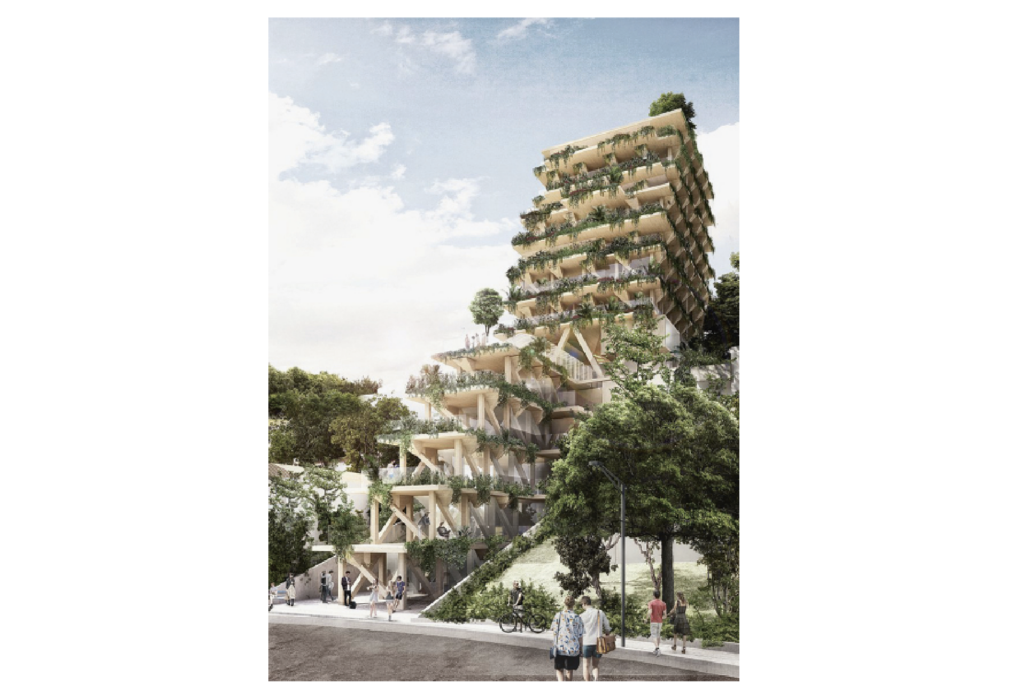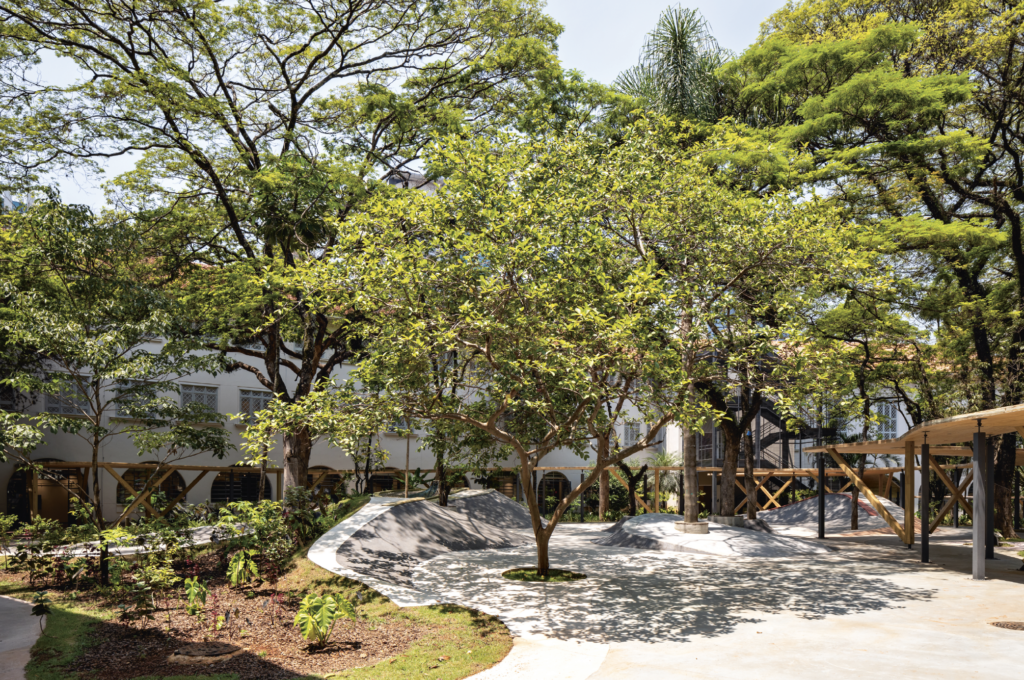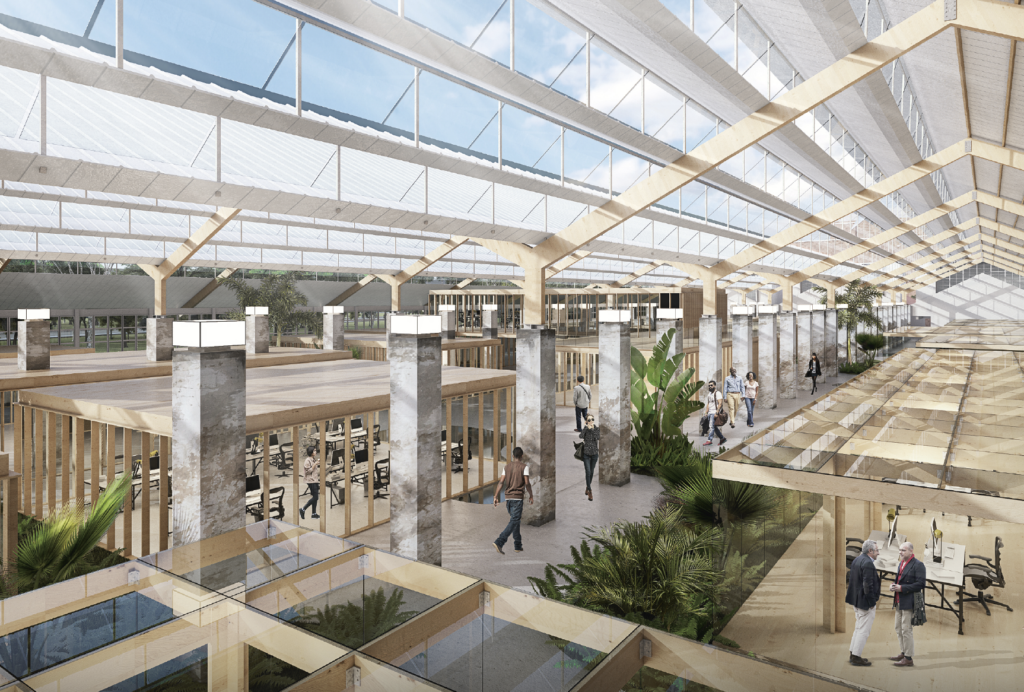Carolina Bueno is an architect and designer from São Paulo, Brazil. Together with her partners she runs Triptyque, a large architectural design office in Paris and São Paulo working on projects across different scales. I have known Carolina for years as one of the most charming and flirtatious architects out there, but I have not had the opportunity to speak to her about eroticism until now.
David van der Leer: Before we dive into people and eroticism, let’s talk about city life and cities in general – a topic I know you and I both like to talk about. How would you characterise São Paulo?
Carolina Bueno: Fun. I have just returned to São Paulo from New York City, where my sister lives, and I was thinking how both of our cities have so much energy, but that it is a very different type of energy. New York has this crazy vibration on the sidewalks. It is about people, about movement. Here in São Paulo we have a deep vibration also, but it is much more mechanical. It comes from the cars, the busses – it is the streets that vibrate here more than the sidewalks. In a way it is logical. The density of São Paulo is much lower than New York’s. Our city is incredibly spread out. It occupies a territory that is roughly the size of a small European country, and on top of that there is no good subway system. As a result, everybody has to travel great distances by road, resulting in a lot of road traffic. It makes São Paulo such a mechanical city.
Now that I think of it, there is one other thing about São Paulo that has been haunting me these last years, which may be interesting for this conversation. Perhaps more so than most cities, São Paulo is about consumption. I don’t mean this so much in terms of the actual idea of going shopping, or of having stores all around the city. We have all that of course, and it brings an exciting vibrancy to neighbourhoods. No, I am more interested in some of the emotional and behavioural aspects behind consumption and shopping. Shopping and consumption today are about using something until you tire of it, until something starts aging, until you just lose interest. Today, when something gets old, you just consume something else. You don’t wait for it to fall apart – you just move on.
David: Right, it seems there is less and less value attached to the things, and to the experiences we consume. As long as they are new, look good and can be constantly replenished, we are excited. To an extent that was perhaps always the case. Yet the pace at which interest is lost, or things break down, is becoming even faster these days. It has to do with the quality of production, our desire for the new and the speed of everyday life with social media, online retail and delivery.
Carolina: We started treating São Paulo the same way – perhaps even before our cultures became so blatantly about consumption. In the last decennia, we have turned the city into a consumed city, with consumed architecture. We don’t really plan our city; we just use it. When we are done with it, when we run into problems or when we have made enough money with a development, we pull our hands away, we throw it away, we sell it and we simply move on to the next frontier. In many ways it is a city without future, or better said, a city without a vision for the future. It is the present that counts here.
It bothers me that we don’t seem to analyse what works in parts of the city and what doesn’t work. Why don’t we want to know? Why don’t we want to invest in improving what already exists? Why don’t we value validation of the parts of the city that we have created?

AMATA Urban Forest project, São Paulo, Brazil. Set to be completed in 2020. Courtesy: Triptyque
David: Your point about this having begun in São Paulo before conspicuous consumption had started is interesting to me. It would be easy to say that the way São Paulo is unplanned reflects that system of consumption, but what you are alluding to by looking at change over the last few decennia actually means that this is deeper than today’s consumption behaviour. Does this have to do more with some of the core characteristics of people living in and coming to São Paulo? Does this have more to do with their striving for freedom, entrepreneurial spirit and having to work so hard that it’s difficult to notice what’s good about what’s already there? Does this mean that people also feel very little connection to the city, and perhaps as a result of that, also little responsibility for it?
Carolina: Yes, responsibility is a good concept to play with in this context. There isn’t much of a plan in place here for five, ten, twenty or fifty years from now. But perhaps it’s even more of a maturity thing that we are dealing with. We are an immature society. Unlike many European countries, we don’t have the weight of history on our shoulders. In the big picture, as a country we are brand new, and we are still trying to understand ourselves. This might have an impact on how people here don’t feel the city belongs to them. There is not much of a sense of belonging to the city. Most people probably think: I pay my taxes, yet I don’t see how I get these back. I don’t get anything back from the city. The city is not mine. But there are small changes: something happened a few years ago under the former mayor, Fernando Haddad, who ended up running unsuccessfully for president. He is a philosopher of sorts, and has a big personality. He invited people in the city to appropriate the city more. It was like invading it with friendliness, so as to express yourself and to have fun.
I saw first-hand its effect on how people experience each other and the city. It brought a sense of community and people started feeling more ownership over their neighbourhoods.
David: Did this only apply to the different neighbourhoods around the city or was there also moment of collective care and celebration?
Carolina: Yes, we now have this amazing event every Sunday when Paulista Avenue is ‘open to pedestrians.’ It is an enormous street and the most important in São Paulo. Thousands of people come out every Sunday to celebrate the city, public space, the street and each other. It is an incredible experience. I go every Sunday myself. It is awesome. There is music everywhere, people are eating, dancing, walking, exercising. And you know – so much of it has to do with the way people relate to the body here.
David: Hah. What is it with Brazilians and the body?
Carolina: Yeah, right?! There is a very open and visible relationship with the body, and with touch for that matter. Of course, it is partially the result of the weather, but I think it has to do more with us all needing to find a counterbalance to the struggles of everyday life here in our tough cities. Our flaunting of the body, and of touch, has to do with needing to compensate for those long commutes, and for other daily struggles. Brazilians compensate by having fun, by celebrating liberty, freedom and love. And first and foremost, by celebrating our bodies.
…To outsiders it may feel very sexual, but to us it is a more sensual part of everyday life…
David: And does that have to do anything with the erotic to you?
Carolina: To outsiders it may feel very sexual, but to us it is a more sensual part of everyday life. We have much more ease around touching, around hugging and perhaps even around kissing. There is so little hidden here. You see people’s skin and it is so easy to touch somebody, but most of the time it is not about something erotic to us. The actual game of seduction plays out at a very different level here. It is more about the eyes than about the body, movement or touching.

Concept School, São Paulo, Brazil, designed by Triptyque. Photo: Fran Parente
David: If you look at your own life, and seduction, in professional as well as personal settings, how do you seduce? Is it through words? Through the eyes? What is it?
Carolina: I like playing with seduction a little, for sure. [laughs] It is an important part of my way of being. When I am here in Brazil, it doesn’t feel like something I use, it just happens. But when abroad I realise it more. There, I am easily misunderstood, because I’m so free with my body. I like to touch people, I like to hug people, but abroad it’s not as normal to talk to someone and then touch the person. These days I censor myself a little when I realise I am being too Brazilian.
David: If you look at your family – I don’t know if your parents or aunts and uncles are alive – but, do you, for instance, see a difference in how they may have been thinking about sensuality compared to our generation?
Carolina: For sure! We are a Catholic family. And my parents, and the other family members of their generation, are really the children from a young country with that immature society that I was telling you about earlier. Many people from those generations suffer from being very narrow-minded. They must see me as something from another world. But then the generation after mine is a whole different story even to me. I have a nephew, for instance, who is twenty-eight years old. And it is great fun to see him and his generation grow up. They are all bi-sexual, tri-sexual, all kinds of sexual. It’s so normal to them to be just like that.
…It is not about sex. It is about fun, about celebrating the body, about the city, about connecting with people…
David: So younger generations of people in São Paulo compensate by having fun, but you seem to have a special talent for fun also. When did you realise you were good at having fun? As you know, architects are often incredibly serious so at first it surprised me when I met you.
Carolina: Hah. It comes naturally to me. I don’t know what else to do. I already did it while studying at the École des Beaux-Arts in Paris and somehow never stopped. And while amazing at the time, the parties at school in Paris feel a bit childish when looking back now. There was always this formal aspect to things – and now I realise that I see this often outside of Brazil. Here in Brazil you put three people and a guitar together and you have a Samba party, and in Paris? Well, it takes so much more there.
What makes parties less formal here in São Paulo, is that relationship with the body we were just chatting about. Obviously the body, music and dance can bring communities together here – more so than you see in other places around the world. For that reason I have been collaborating with friends to create this large carnival event in the city for the last ten years: Bloco Baixo Augusta.
It grew from just a few hundred people to one million people this year. It has become a huge celebration. Our carnival is open to all – from gay to straight and from young to old. Of course, many people who join for the event operate at the left side of the political spectrum. They are looking for this event as a way to celebrate their freedoms and liberty.
Every year the carnival forms this special moment outside of time, outside of reality. For instance, at the last carnival that we organised, right outside of the office here for all those thousands of people, I was walking around in this tiny glittery outfit. Imagine: I am half-naked in front of my office, where I come every day, and it’s okay. It is not about sex. It is about fun, about celebrating the body, about the city, about connecting with people. For many of us carnival is a tool. It is a formal tool to express oneself, but, it’s also a tool to play with your body, to play with your neighbours, with your friends. It’s a moment in the year when you know you are going to play and have fun. We use it to reboot our systems, and to try and reactivate our freedom of being. And because people realise how carnival can make you feel good, and free, it has started to become longer and longer. It used to be three or four days, and it now lasts for a month. Maybe in ten years, we will have a whole year of carnival. Carnival is becoming a verb: to carnival.

Iron House, designed by Triptyque
David: Does that sense of freedom and play only happen with carnival, or could it happen at other moments during the year?
Carolina: Carnival is a special moment for sure but there are some other interesting things happening now in Brazil throughout the year. For instance, there is this new music movement that started in the favelas in Rio de Janeiro. It’s not unlike the rap or hip-hop scenes in the United States, but in this case it is funk music: funk carioca. It’s very extreme, and it aggressively addresses social issues. They have taken the body and sensuality as extreme forms of expression. As with general youth culture, it pushes super hard against society. They are very open about sexuality, social liberties and freedom. Their fan base is fascinating, and the movement has spread to São Paulo. The girls wear these revealing outfits and the boys are covered in metal. You can tell that to the girls in this scene, it is strongly about showing female power, that they can do whatever they want with their bodies. For example, I saw videos of some young woman that is going really, really far, to the extent that it becomes vulgar. In my opinion it would even be more powerful if they toned it down a little. Or does it need to go that far to be understood these days?
David: Do you ever feel jealous towards that generation and your nephew’s?
Carolina: I think it is incredible how free they seem. At the same time, I sense frustration among them. They are fighting for their freedoms, but sometimes I wonder if they are trying to push too hard. They push, push, push and then they get frustrated, so they push even harder.
David: Instead of only pushing so hard, and that anxiety, I more and more wonder if there could be more poetry in society. I’m not sure if this is a generational thing, or if is just my personality. Perhaps we are just wired differently?
Carolina: We are a rarity in this world, David. It is concerning to me that this world is becoming so extreme. I still cannot believe what world we are living in in terms of political movements, and shady things. There is nowhere to go. Fifty years ago, our parents and grandparents’ generations had this idea to go the moon and live there, and it makes sense again, because, where can we still live in freedom in this extreme world? Can we go to the moon instead? Let’s go to the moon.